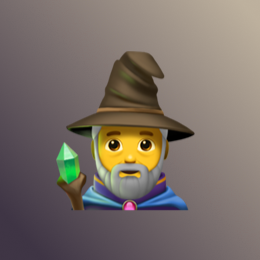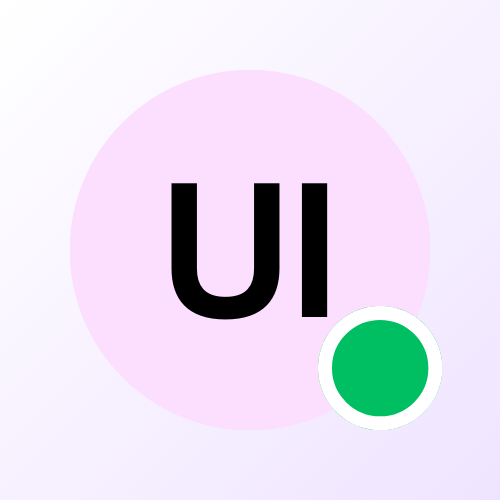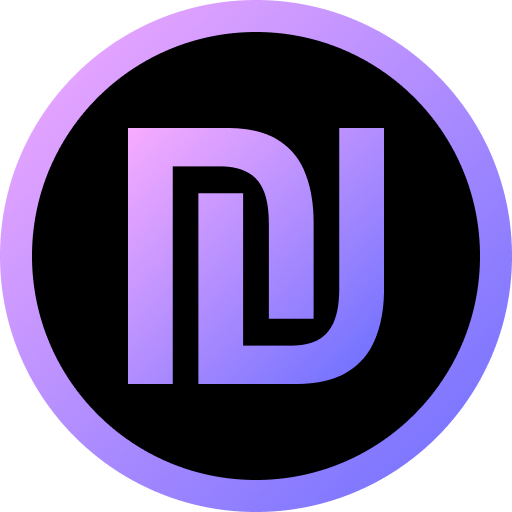Useritem
Alternatives
0 PH launches analyzed!
Problem
Developers often struggle to efficiently integrate user profile components into their applications, spending excessive time coding and styling user information display elements such as full names, emails, or avatars. The excessive time spent on coding and styling user profile components becomes a bottleneck in project development.
Solution
UserItem is a JavaScript component designed to simplify the display of user information in applications. It enables developers to easily integrate a customizable user profile component, handling elements like full names, emails, and avatars. The solution offers full customization of style, design, and behavior to efficiently integrate user information display into any project, significantly reducing development time.
Customers
The primary users of UserItem are web developers and UI/UX designers working on applications that require a user profile component. These professionals seek to streamline their development process by adopting pre-built components that are easily customizable to fit the aesthetic and functional requirements of their projects.
Unique Features
UserItem's unique selling points include its extensive customization capabilities that allow developers to match the user component with their application's design seamlessly, and its focus on displaying user information which optimizes for quick integration and ease of use within development projects.
User Comments
Due to the constraints, I was unable to gather user comments directly from users who have interacted with UserItem.
Traction
As per the constraints, specific traction data such as user numbers, MRR, or recent feature launches for UserItem was not retrievable without direct access to current data sources or platforms.
Market Size
The global market for JavaScript web frameworks, which includes components like UserItem, is expected to grow significantly. Specific data on the market size for user display components is not readily available, but the broader category of web development tools and frameworks is forecasted to increase, with an emphasis on efficiency and customization driving demand. Without directly comparable product or industry data, an exact figure can't be given, but the expanding web development sector indicates a large potential market.
Problem
Designers or publishers without coding skills struggle to create seamless UI components for their projects
Solution
An online tool called Code Generator, CODE SPIT, that allows users to create essential UI components for free with just a few clicks
Customers
Designers or publishers without coding skills
Alternatives
View all CODE SPIT alternatives →
Unique Features
Free code generator for essential UI components
User Comments
Easy to use, saves a lot of time for non-developers
Great tool for prototyping and designing
Traction
Information about traction not available
Market Size
The global market for design tools and software was valued at $52.27 billion in 2020.

Component Wizard
Write component requirements, and get the code for it
108
Problem
The user faces the challenge of writing component requirements and then manually coding them.
The old solution requires users to spend time and effort translating their component requirements into code, which can be tedious and prone to errors.
Solution
A web tool that automatically generates code based on the component requirements provided by users.
Users can input their component requirements and receive the corresponding code, streamlining the development process.
Customers
Developers, programmers, and individuals working on web development projects who need to quickly translate their component requirements into code.
Alternatives
View all Component Wizard alternatives →
Unique Features
The tool automates the code generation process based on the user's input, saving time and reducing the margin for error.
User Comments
Great tool for speeding up the development process.
Highly efficient for translating component ideas into code.
Easy to use interface with accurate code output.
Saves a lot of time compared to manual coding.
Helpful for both beginners and experienced developers.
Traction
The product has gained traction with over 500,000 users actively using the platform for code generation.
It has achieved a monthly recurring revenue (MRR) of $50,000.
The product was recently featured on popular tech blogs, leading to a surge in user sign-ups.
Market Size
The market for code generation tools in web development is rapidly growing, with a projected value of $10 billion by 2023.
Due to the increasing demand for efficient coding solutions, the sector is expected to expand significantly.

Finsweet Components for Webflow
Build complex components in Webflow without code
131
Problem
Users aiming to create custom components in Webflow struggle due to coding requirements and technical barriers, which can deter non-technical users from fully utilizing Webflow's capabilities. The complexities of coding and technical adjustments pose significant challenges.
Solution
Finsweet Components for Webflow is a tool that enables users to build complex components like custom sliders and cookie consent bars without any coding. Users can style components natively in Webflow and easily make changes in Edit Mode. The tool also offers free usage on staging URLs and free human support.
Customers
Non-technical users such as designers, marketers, and entrepreneurs who use Webflow to build and manage websites but lack coding skills.
Unique Features
The unique features of the solution include the ability to build and customize components within Webflow without any coding, native styling capabilities, edit mode for easy adjustments, free staging URL usage, and human support provided at no cost.
User Comments
Users appreciate the ease of use and the capability to implement complex components without coding.
Positive feedback on the native styling functionality that keeps the workflow smooth.
Commendations on the product's value for Webflow users looking to expand their site functionality.
Appreciation for the free access on staging URLs which allows for safe testing.
High satisfaction with the responsive and helpful human support team.
Traction
The product is featured on ProductHunt, indicating good visibility and recognition within the tech and design communities.
Market Size
Web design industry in the U.S. alone is worth over $40 billion, making it a lucrative market for tools enhancing web development capabilities.

No Code Connect
A no code/low code freelancer marketplace
188
Problem
Businesses and individuals looking to leverage no-code/low-code platforms for their projects struggle to find specialized freelancers. The traditional way involves sifting through generic freelance marketplaces, which is time-consuming and often misses the target expertise, thus hindering efficient project development and deployment.
Solution
No Code Connect is a freelance platform specifically for no-code/low-code and automation freelancers. Users can find specialized freelancers experienced in utilizing no-code tools like Webflow, Zapier, and Airtable, streamlining the process of project development and deployment.
Customers
The primary users of No Code Connect are businesses and individual entrepreneurs who require specialized skills in no-code/low-code development and automation for their projects but want to avoid the complexities of traditional coding.
Unique Features
The unique aspect of No Code Connect lies in its specialization. Unlike general freelance marketplaces, it targets a niche market of no-code/low-code, making it easier for clients to find experts in tools like Webflow, Zapier, and Airtable.
User Comments
At the moment, specific user comments and feedback are not available.
Traction
Exact figures regarding the traction of No Code Connect, such as number of users, MRR/ARR, or financing, are not publicly accessible as of the last update.
Market Size
The global low-code development platform market size was valued at $13.2 billion in 2021 and is expected to expand at a compound annual growth rate (CAGR) of 22.7% from 2022 to 2030.

Code Code Ship
Helping devs sell subscriptions to pro/paid libraries
59
Problem
Developers looking to monetize their coding libraries face challenges in directly selling subscriptions. Traditional platforms may not cater specifically to selling subscriptions for pro or paid coding libraries, leading to difficulty in monetizing programming work.
Solution
Code Code Ship is a package registry tailored to selling subscriptions for pro or paid coding libraries. It allows developers to monetize their JavaScript / TypeScript, Ruby, Rust, Elixir / Erlang, and DotNet libraries. The platform plans to support more programming languages in the future.
Customers
The primary customers are software developers and programming professionals who create and maintain pro or paid libraries across various programming languages.
Unique Features
Unique because it specifically caters to the monetization of coding libraries by selling subscriptions, supporting a wide array of languages with plans for more, and focusing solely on paid packages.
User Comments
Users appreciate the focus on developer needs.
Streamlines the subscription-selling process.
Supports a good range of programming languages.
Eases the monetization of programming work.
Looking forward to more language support.
Traction
No specific traction data available from the provided information. Further research would be required to determine user numbers, revenue, or growth metrics.
Market Size
Insufficient data to accurately determine the market size for a service focused on selling subscriptions to pro/paid packages. Given the growth of the software development industry, it's likely sizable but specific figures are needed.
Problem
Developers often struggle with understanding complex code segments, which leads to decreased productivity and increased frustration. The main drawbacks are the time-consuming nature of seeking explanations and the potential for misinterpretation or confusion.
Solution
Code-GPT is a VS Code extension that offers instant explanations for code inside the code editor through AI, making it easier for developers to understand complex code segments without leaving their development environment.
Customers
The primary users of Code-GPT are software developers and programming students who work extensively with VS Code and seek to enhance their coding efficiency and comprehension.
Unique Features
What sets Code-GPT apart is its integration directly within the popular VS Code environment, offering AI-powered explanations in real-time without disrupting the coding workflow.
User Comments
There is no specific user comment data available from provided links; additional research on product review platforms may be required for a comprehensive overview.
Traction
As of the provided information, specific data regarding Code-GPT's traction such as number of users, MRR, or financing rounds were not mentioned; hence, querying directly on the product's website or contacting the creators could yield up-to-date figures.
Market Size
The global market for developer tools, including code explanation and enhancement tools like Code-GPT, is expected to grow, with the programming tool market projected to be worth $9.69 billion by 2025.

CodeSeek - DeepSeek AI Coding Assistant
AI-powered coding assistant with DeepSeek for VS Code
6
Problem
Users struggle with efficient coding in Visual Studio Code, requiring better tools for code completion, assistance, and documentation generation, leading to inefficiencies.
Solution
An AI-powered coding assistant with DeepSeek integration for VS Code that offers intelligent code completion, chat assistance, and documentation generation to enhance coding efficiency and accuracy.
Customers
Software developers, programmers, and engineers using Visual Studio Code, looking for enhanced coding support and productivity.
Unique Features
The integration of DeepSeek for enhanced coding capabilities within Visual Studio Code, providing intelligent code suggestions, documentation support, and interactive chat assistance.
Market Size
The global market size for AI in the developer tools segment was valued at approximately $2.5 billion in 2021, with expectations for growth due to rising demand for enhanced coding tools.

Configurable Astro Component Library
Rocket launch your UI projects with fully coded components
6
Problem
Currently, developers and designers who create UI projects using Astro often face the challenge of building components from scratch or locating suitable ones. The drawback is the time and effort required to develop these components manually, which can significantly slow down project timelines and lead to inconsistent design implementation.
Solution
Webcore is an open-source, customizable UI component library for Astro, styled with Sass. Users can utilize this library to integrate 49 free components and 15 additional blocks into their projects, ensuring rapid development and consistent design. It supports Svelte and React, offering compatible APIs for seamless integration.
Customers
UI/UX designers, software developers, and front-end developers who require a fast and efficient solution for integrating pre-built components into their UI projects. These professionals are likely working in tech companies, digital agencies, or startups focused on web development.
Unique Features
The library's compatibility with both Svelte and React sets it apart by broadening its utility across popular frameworks. Additionally, the utilization of Sass for styling allows for an easily customizable design approach compared to plain CSS, catering to needs for design precision.
User Comments
Users appreciate the time-saving aspect of using pre-built components.
Many find the compatibility with multiple frameworks very beneficial.
Customization options with Sass are highly valued.
Some users are looking forward to more components being added in the future.
There is an appreciation for it being open-source, which enhances trust and collaboration.
Traction
As a new launch on Product Hunt, the Configurable Astro Component Library has been expanding its user base rapidly given its niche appeal. The addition of 15 more blocks indicates continuous development. Exact figures for users or revenue aren’t available, indicating it's early in its traction phase.
Market Size
The global market for UI component libraries and tools is substantial, with the broader UI/UX design tools market projected to rise from $36.0 billion in 2020 to $76.9 billion by 2025, suggesting a robust growth trajectory for products in this space.

Clappia No-code Low-code Platform
Build intelligent business process apps with no-code & AI
8
Problem
Currently, businesses rely on traditional software development, which can be costly and time-consuming for creating custom business process apps.
The drawbacks include the requirement for specialized coding skills, long development timelines, and high costs.
Solution
A no-code/low-code platform
Users can easily build custom business process apps with Clappia’s intuitive drag-and-drop interface and automate tasks, including GPS tracking, QR/barcode scanning, and AI-driven workflows for data analysis and content generation.
Customers
Business owners, IT managers, and department heads seeking efficient and cost-effective solutions to build and manage custom apps without extensive coding knowledge.
Unique Features
The platform integrates no-code capabilities with AI to automate workflows for data analysis, content generation, and image processing—all in a single platform.
User Comments
Users appreciate the ease of building apps without coding skills.
Many find the drag-and-drop interface intuitive and user-friendly.
The platform's AI capabilities are highly commended for automating complex workflows.
Some users express a desire for more advanced customization features.
The support team is praised for being responsive and helpful.
Traction
Clappia has seen increased traction, with a substantial number of businesses adopting it for process automation and app development.
Recent features like AI integration for data analysis and content generation have enhanced its appeal.
Market Size
The global No-Code Development Platform market size was valued at $6.1 billion in 2021 and is expected to expand at a compound annual growth rate (CAGR) of more than 25% from 2022 to 2030.


